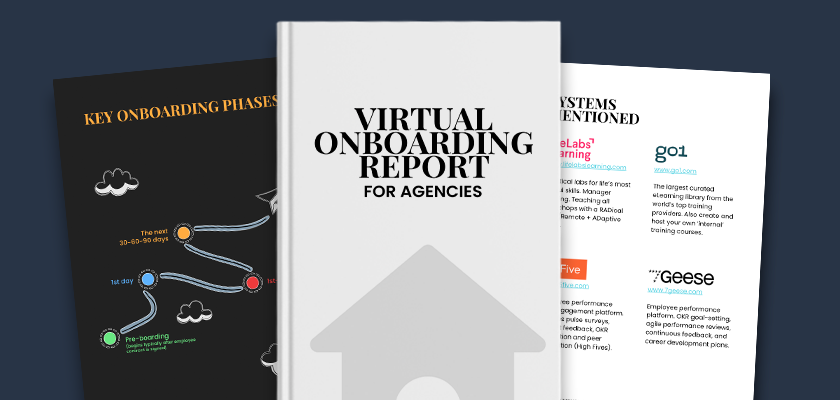I was delighted to hear this week that a long time contact of mine and Founder of Polymensa – Daniel De La Cruz – had been busily working away on an in-depth 34 page report on virtual onboarding.
Backed by interviews and validated by real agency starters, Polymensa’s Virtual Onboarding Report provides some exceptional insight on how to navigate the challenges that remote onboarding brings (not sure what onboarding is click here).
Armed with research from 41 progressive agencies, Polymensa set about creating an in-depth report on virtual onboarding to help others learn from some of the best SAAS businesses and agencies. Key takeaways include…
Virtual Onboarding – Key Stages
Research from Polymensa discovered that the majority of companies had established a similar onboarding process:
- Pre-boarding
- 1st day
- 1st-2nd week
- The next 30-60-90 days
Detailed pre-boarding plan
Research found that the majority of companies who implemented a pre-boarding plan were met with a significant reduction in the number of hires leaving during the probation period.
These pre-boarding plans were kept in either a system or simple spreadsheet; examples of exact systems used can be found in the Virtual Onboarding Report.
As part of the pre-boarding process, some agencies also included org-charts containing employee photos and department information. This simple step helped new hires feel welcomed and part of the team, as well as giving them an overview of how each department was run.
Avoiding information overload
The majority of agencies were cautious about overloading new starters with heavy information, aware that it could lead to burnout and decreased productivity. There was a general pattern in that most agencies set out clear policies for virtual meetings and online work.
One agency in particular capped meetings to three a day, keeping the duration within a 20-minute timeframe. Others had clear policies around system notifications, making sure recruits didn’t feel the need to be constantly online to be seen as doing work.
The people ops director was crucial to all agencies in this role as they remained a source of support and guidance for new hires.
Setting out clear schedules
Companies that set out clear schedules for their new hires were met with more positive feedback from their starters. These schedules often spanned a period of 1-2 weeks and included calendar invites for key dates and meetings. Knowing what to expect before your first day, significantly reduced the anxiety of starting a new job – especially in a virtual onboarding set up.
Virtual social events
Polymensa found that all companies had implemented some kind of virtual social event within the last 12 months, helping to boost morale and connect new starters with the rest of the team. As well as fostering a healthy remote office culture these events also helped facilitate better working relationships within the team.
As novelty could wear off it was crucial to keep events varied. Some of the most highlighted virtual events included:
1-to-1 virtual coffees/lunches
Half of the agencies interviewed prepared virtual coffee/lunch meet-ups between new hires and the rest of the team. Vouchers were expensed by the company to encourage interest in the catch-ups and the “meeting host” was equipped with information about the new starter to help facilitate conversation.
“2 truths and a lie” game on Slack/MS Teams
Agencies found that this was a fun way of getting to know one another while also boosting morale and connection.
Whatsapp group
Used as a form of social chat, whatsapp groups were beneficial in facilitating conversation between starters and the rest of the team as well as providing a sense of office culture.
Buddy systems
Polymensa found that almost every agency implemented a buddy system during the onboarding process, helping to make new hires feel welcomed and part of the team. Companies found that having a buddy system provided another means of support for new hires; this in turn helped ease pressure off line managers.
The buddy system was implemented in a number of ways:
- New hires were paired with someone with a different skill set from their own;
- New hires were paired with someone who had been in the company for a number of years;
- New hires were paired with senior staff;
- New hires were paired with those with the same skill set (e.g. developer and developer).
The full report contains 34 pages of practical tips to improve your virtual onboarding plus plenty more great tips for your agency. If you are hiring reach out to myself richard@gurucareers.com or Daniel De la Cruz for further learning and onboarding advice: daniel@polymensa.com.


